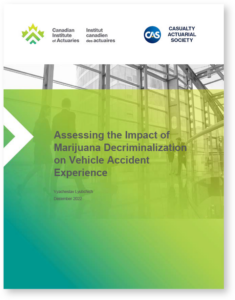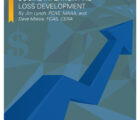
Regional changes in the legal rules on using marijuana have affected the insurance risks related to cars. A new report from the Canadian Institute of Actuaries (CIA) and the CAS analyzes the impact of marijuana decriminalization on the vehicular accident experience in Canada and the United States.
The study did not detect any statistically significant impacts of decriminalization on the car accident fatality rate, insurance claim frequency or average cost per claim, particularly over the long term.
 “Assessing the Impact of Marijuana Decriminalization on Vehicle Accident Experience” finds that there were no significant changes to the trend and seasonal variations in Canadian traffic accidents after the change in legal status. Similarly, the estimated state-wide effects of decriminalization in the U.S. do not show any consistent, significant results that would support a conclusion that decriminalization led to an increase in road accidents or fatalities.
“Assessing the Impact of Marijuana Decriminalization on Vehicle Accident Experience” finds that there were no significant changes to the trend and seasonal variations in Canadian traffic accidents after the change in legal status. Similarly, the estimated state-wide effects of decriminalization in the U.S. do not show any consistent, significant results that would support a conclusion that decriminalization led to an increase in road accidents or fatalities.
Temporal patterns of human activity (such as yearly, weekly and daily cycles) and inclement weather are much better predictors of the vehicle accident experience than marijuana decriminalization.
Canadian and U.S. data for 2016-2019 were used in the study, including official reports on collisions of private vehicles and losses in Canada, fatal accidents and weather factors in the U.S. For each data source, statistical and machine learning models were chosen to account for different sources of variability.
The analysis of 10 Canadian regions accounted for the regional differences and modeled a baseline linear trend that was also observed in the pre-legalization data alone. The analysis showed no statistically significant changes in the average cost per claim or claim frequency after marijuana legalization in Canada. The quarterly data available for Québec led to similar findings.
The U.S. results varied by the state pair selected as the control in statistical comparisons. The tests for the decriminalization effect on fatalities failed to detect a statistically significant change. The machine learning techniques also allowed the author to account for other factors, including the weather and annual and weekly patterns of fatalities.
The study overcomes the limitations and disadvantages of earlier research on the effects of marijuana decriminalization by incorporating novel data-driven methodologies that do not rely on the linearity of relationships or parametric inference.
“The methods used in this research include improved statistical models, machine learning and other data science techniques. The models used high-resolution weather data to account for the effects of weather factors,” says the report author, Dr. Vyacheslav Lyubchich.













